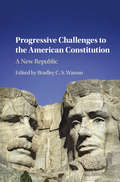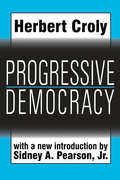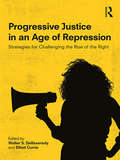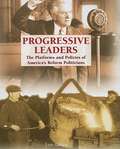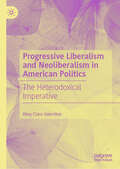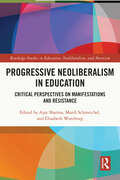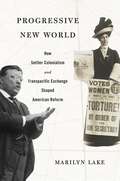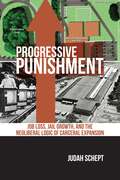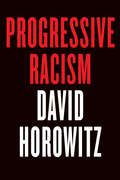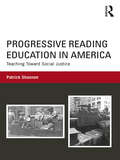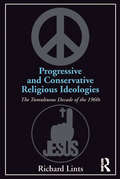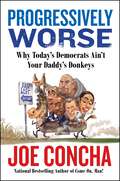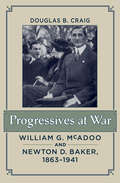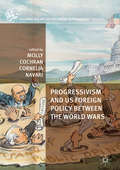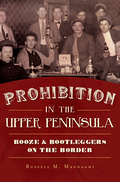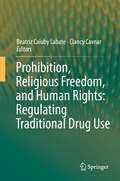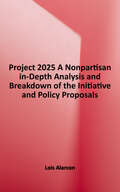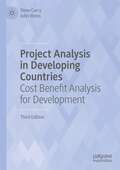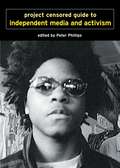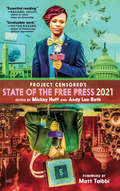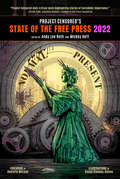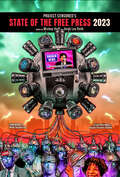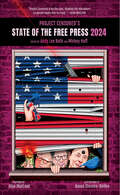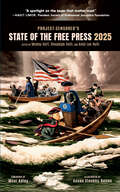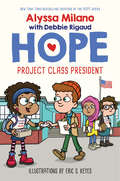- Table View
- List View
Progressive Challenges to the American Constitution: A New Republic
by Watson Bradley C. s.In this volume, Bradley C. S. Watson brings together the leading scholars who have sparked one of the most important intellectual and political movements of our times: the criticism of the progressive intellectual synthesis that has dominated American thought and politics over much of the last century, and has provided the framework in which the administrative state has expanded and flourished. The contributors address the most important questions raised by this movement: what is the meaning of progressivism? What is the nature of the Founders' Constitution and the progressive challenges to it? What is the significance of recent scholarship and public opinion that have arisen in opposition to the progressive vision? What are the implications of American progressivism for twenty-first century politics and policy? Progressive Challenges to the American Constitution addresses the growing doubt about the scope and sustainability of expanded government power.
Progressive Democracy
by Herbert CrolyCroly explains the requirements for a genuinely popular system of representative government providing progressive liberalism with both a philosophical critique of the founding fathers' political outlook, and a political strategy for replacing it with something more in keeping with a new epoch. Although it was written in 1914, the intellectual structure remains largely intact within the liberal-progressive tradition.
Progressive Justice in an Age of Repression: Strategies for Challenging the Rise of the Right
by Elliott Currie Walter S. DeKeseredyProgressive Justice in an Age of Repression provides a much-needed engagement with questions of justice and reform within the current phase of global capitalism, one that is marked not only by significant social inequality, but also political bifurcation. It offers guidance on progressive strategies for resistance. It also extends criminological analysis by situating these contemporary challenges as globalized and inextricably linked to questions of political economy, law, and society. Bringing together an international selection of scholars, this book draws on a range of issues, such as immigration, street crime and the renewed push for "law and order," violence against women, environmental injustice, assaults on health care and social services, and the unleashing of private corporate exploitation of natural resources. It is a clarion for strategic thinking, a call for action fuelled by informed analysis, and a reimagining of the progressive society that is under attack by Trumpism, populism, and a rising right. This is an important read for those who teach and study criminology, deviance and social control, social problems, legal studies, political science, and policy studies. It is also a useful resource for practitioners, community-based activists, and policy makers seeking new ways of thinking critically about crime, law, and social control.
Progressive Leaders: The Platforms And Policies Of America's Reform Politicians
by Lois SakanyStudents will gain an understanding and appreciation of the most important people who defined the Progressive Era: the Great Commoner William Jennings Bryan, Senator Robert La Follete and his liberal politics, Theodore Roosevelt and his Square Deal Policy, and Woodrow Wilson and the establishment of the Federal Trade Commission. This title will reinforce one view that the progressive accomplishments left a positive impact on society, while the other view is that they gave too much power and responsibility to government.
Progressive Liberalism and Neoliberalism in American Politics: The Heterodoxical Imperative
by Riley Clare ValentineThis book examines twentieth and twenty-first-century American political discourse through the framework of progressive liberalism and neoliberalism. Progressive liberalism and neoliberalism as forms of normative reason redefine specific political concepts, which are central to American liberalism—equality, liberty, the role of the state, and the pursuit of happiness. Language is how political reason and the norms accompanying it are expressed. The text moves through Presidents Franklin Delano Roosevelt to Barack Obama, exploring shifts in language and interpretations of political concepts through progressive liberal and neoliberal forms of normative reason. A tension emerges between progressive liberalism and neoliberalism, and a heterodoxy emerges. The heterodoxy we find ourselves in continues the problem that is foundational to American liberalism itself—liberalism is inherently a theory and discourse of rights, not of need. Because of this, no form of liberalism can appropriately respond to human needs from a standpoint that is not informed by having a right to or a right from.
Progressive Neoliberalism in Education: Critical Perspectives on Manifestations and Resistance (Routledge Studies in Education, Neoliberalism, and Marxism)
by Ajay SharmaThis volume makes the novel contribution of applying Nancy Fraser’s concept of progressive neoliberalism to education in order to illustrate how social justice efforts have been co-opted by neoliberal forces. As well as recognising the lack of consensus surrounding the very nature of Fraser’s concept of progressive neoliberalism, the book delivers a diversity of perspectives and methodological orientations that offer critical and nuanced examination of the diverse ways in which progressive neoliberalism has shaped education in North America. Documenting manifestations of progressive neoliberalism in areas including anti-racist education, teacher education, STEM, and assessment, the volume uses qualitative empirical research and critical discourse analysis to identify emerging tools and strategies to disentangle the progressive aims of education from neoliberal agendas. Offering a rarely nuanced treatment of the phenomenon of neoliberalism, this text will benefit scholars, academics, and students in the fields of education policy and politics, the sociology of education, and the philosophy of education more broadly. Those involved with the theory of education and multicultural education in general will also benefit from this volume.
Progressive New World: How Settler Colonialism and Transpacific Exchange Shaped American Reform
by Marilyn LakeIn a bold argument, Marilyn Lake shows that race and reform were mutually supportive as Progressivism became the political logic of settler colonialism at the turn of the 20th century. She points to exchanges between American and Australasian reformers who shared racial sensibilities, along with a commitment to forging an ideal social order.
Progressive Punishment: Job Loss, Jail Growth, and the Neoliberal Logic of Carceral Expansion (Alternative Criminology #1)
by Judah ScheptWinner, 2017 American Society of Criminology's Division on Critical Criminology and Social Justice Best Book AwardAn examination of the neoliberal politics of incarceration The growth of mass incarceration in the United States eludes neat categorization as a product of the political Right. Liberals played important roles in both laying the foundation for and then participating in the conservative tough on crime movement that is largely credited with the rise of the prison state. But what of those politicians and activists on the Left who reject punitive politics in favor of rehabilitation and a stronger welfare state? Can progressive policies such as these, with their benevolent intentions, nevertheless contribute to the expansion of mass incarceration?In Progressive Punishment, Judah Schept offers an ethnographic examination into the politics of incarceration in Bloomington, Indiana in order to consider the ways that liberal discourses about therapeutic justice and rehabilitation can uphold the logics, practices and institutions that comprise the carceral state. Schept examines how political leaders on the Left, despite being critical of mass incarceration, advocated for a “justice campus” that would have dramatically expanded the local criminal justice system. At the root of this proposal, Schept argues, is a confluence of neoliberal-style changes in the community that naturalized prison expansion as political common sense among leaders negotiating crises of deindustrialization, urban decline, and the devolution of social welfare. In spite of the momentum that the proposal gained, Schept uncovers resistance among community organizers, who developed important strategies and discourses to challenge the justice campus, disrupt some of the logics that provided it legitimacy, and offer new possibilities for a non-carceral community. A well-researched and well-narrated study, Progressive Punishment offers a novel perspective on the relationship between liberal politics, neoliberalism, and mass incarceration.
Progressive Racism
by David HorowitzProgressive Racism is about the transformation of the civil rights movement from a cause opposing racism-the denigration of individuals on the basis of their skin color - into a movement endorsing race preferences and privileges for select groups based on their skin color. It describes the tragic changes of this cause under the leadership of racial extortionists like Al Sharpton, who took a movement in support of American pluralism and turned it into a movement governed by a lynch mob mentality in which white Americans are regarded as guilty before the fact and African Americans are regarded as innocent even when the facts prove them guilty, even when their crimes are committed against other African Americans.The author of Progressive Racism, David Horowitz, is a witness to these events and betrayals. Horowitz was a participant in the civil rights movement of the 1960s, and in 2001 led a national campaign against a proposal for "slavery reparations" that would have required Hispanic, Asian and other Americans who had no role in slavery to pay reparations to African Americans who were never slaves. Progressive Racism examines how the term "racism" has been drained of its original meaning and is now used as a weapon to bludgeon opponents into silence. It describes how the so-called civil rights movement has become an oppressor of African Americans by supporting a failed school system that blights the lives of millions of African American children and a welfare system that has destroyed the black family and created a "underclass" dependent on government charity. It is an indictment of the hypocrisy that today governs discourse on race issues, so that a lynch mob in Ferguson, Missouri seeking to hang a police officer because he was white can be described as a civil rights protest and be supported by the first African American president of the United States.
Progressive Reading Education in America: Teaching Toward Social Justice
by Patrick ShannonThrough firsthand accounts of classroom practices, this new book ties 130 years of progressive education to social justice work. Based on their commitments to the principle of the equal moral worth of all people, progressive teachers have challenged the obstacles of schooling that prevent some people from participating as full partners in social life in and out of the classroom and have constructed classroom and social arrangements that enable all to participate as peers in the decisions that influence their lives. Progressive reading education has been and remains key to these ties, commitments, challenges, and constructions. The three goals in this book are to show that there are viable and worthy alternatives to the current version of "doing school"; to provide evidence of how progressive teachers have accommodated expanding notions of social justice across time, taking up issues of economic distribution of resources during the first half of the 20th century, adding the cultural recognition of the civil rights of more groups during the second half, and now, grappling with political representation of groups and individuals as national boundaries become porous; and to build coalitions around social justice work among advocates of differing, but complementary, theories and practices of literacy work. In progressive classrooms from Harlem to Los Angeles and Milwaukee to Fairhope, Alabama, students have used reading in order to make sense of and sense in changing times, working across economic, cultural, and political dimensions of social justice. Over 100 teacher stories invite readers to join the struggle to continue the pursuit of a just democracy in America.
Progressive and Conservative Religious Ideologies: The Tumultuous Decade of the 1960s
by Richard LintsThis book explores the surprisingly disruptive role of religion for progressive and conservative ideologies in the tumultuous decade of the 1960s. Conservative movements were far more progressive than the standard religious narrative of the decade alleges and the notoriously progressive ethos of the era was far more conservative than our collective memory has recognized. Lints explores how the themes of protest and retrieval intersect each other in ironic ways in the significant concrete controversies of the 1960s - the Civil Rights Movement, Second Feminist Movement, The Jesus Movements, and the Anti-War Movements - and in the conceptual conflicts of ideas during the era - The Death of God Movement, the end of ideology controversy, and the death of foundationalism. Lints argues that religion and religious ideologies serve both a prophetic function as well as a domesticating one, and that neither "conservative" nor "progressive" movements have cornered the market in either direction. In the process Lints helps us better understand the complex role of religion in cultural formation.
Progressively Worse: Why Today's Democrats Ain't Your Daddy's Donkeys
by Joe ConchaIf John F. Kennedy, Tip O’Neill, or even Bill Clinton were to run as Democrat candidates today, their own party would cancel them in a heartbeat.If the Joe Biden of 1992 were to run today, MSNBC would label him “MAGA Joe.” How did JFK’s party of Catholics and union workers become AOC’s party of privileged Ivy Leaguers with “Queers for Palestine” signs and purple hair?Over the past few decades, Democrats have swung so far to the left that they have little in common with past generations of progressives. In Progressively Worse, bestselling author and Fox News contributor Joe Concha highlights how the Democrats used to:· Care about blue collar workers· Protest against new wars· Defend free speech· Criticize the elites and Wall Street· Want limits on immigrationNow, the party of the hippies is now the party of Hamasniks, and the party of feminists now celebrates male athletes in women’s sports. Though spotlights of key influencers like Gavin Newsom, Rashida Tlaib, Keith Olbermann, and Pete Buttigieg, Progressively Worse lays out the facts every American should know about the Democrat party. It’s not even a party anymore. It’s more like the hangover the day after.
Progressives at War: William G. McAdoo and Newton D. Baker, 1863–1941
by Douglas B. CraigCraig's study of McAdoo and Baker illuminates the aspirations and struggles of two prominent southern Democrats.In this dual biography, Douglas B. Craig examines the careers of two prominent American public figures, Newton Diehl Baker and William Gibbs McAdoo, whose lives spanned the era between the Civil War and World War II.Both Baker and McAdoo migrated from the South to northern industrial cities and took up professions that had nothing to do with staple-crop agriculture. Both eventually became cabinet officers in the presidential administration of another southerner with personal memories of defeat and Reconstruction: Woodrow Wilson. A Georgian who practiced law and led railroad tunnel construction efforts in New York City, McAdoo served as treasury secretary at a time when Congress passed an income tax, established the Federal Reserve System, and funded the American and Allied war efforts in World War I. Born in the eastern panhandle of West Virginia, Baker won election as mayor of Cleveland in the early twentieth century and then, as Wilson's secretary of war, supervised the dramatic build-up of the U.S. military when the country entered the Great War in Europe.This is the first full biography of McAdoo and the first since 1961 of Baker. Craig points out similarities and differences in their backgrounds, political activities, professional careers, and family lives.Craig's approach in Progressives at War illuminates the shared struggles, lofty ambitions, and sometimes conflicted interactions of these figures. Their experiences and perspectives on public and private affairs (as insiders who nonetheless were, in some sense, outsiders) make their lives, work, and thought especially interesting. Baker and McAdoo, in league with Wilson, offer Craig the opportunity to deliver a fresh and insightful study of the period, its major issues, and some of its leading figures.
Progressivism and US Foreign Policy between the World Wars (The Palgrave Macmillan History of International Thought)
by Molly Cochran Cornelia NavariThis book considers eleven key thinkers on American foreign policy during the inter-war period. All put forward systematic proposals for the direction, aims and instruments of American foreign policy; all were listened to, in varying degrees, by the policy makers of the day; all were influential in policy terms, as well as setting the terms of contemporary debate. The focus of the volume is the progressive agenda as it was formulated by Herbert Croly and The New Republic in the run-up to the First World War. An interest in the inter-war period has been sparked by America’s part in international politics since 9/11. The neo-conservative ideology behind recent US foreign policy, its democratic idealism backed with force, is likened to a new-Wilsonianism. However, the progressives were more wary of the use of force than contemporary neo-conservatives. The unique focus of this volume and its contextual, Skinnerian approach provides a more nuanced understanding of US foreign policy debates of the long Progressive era than we presently have and provides an important intellectual background to current debates.
Prohibition in the Upper Peninsula: Booze & Bootleggers on the Border (American Palate)
by Russell M. MagnaghiTemperance workers had their work cut out for them in the Upper Peninsula. It was a wild and woolly place where moonshiners, bootleggers and rumrunners thrived. Al Capone and the Purple Gang came north to keep Canadian whiskey passing through Sault Ste. Marie to Chicago and Detroit. Federal enforcement agent John Fillion double-crossed both his office and the bootleggers. The Grand Hotel on Mackinac Island survived due to gambling and fine Canadian whiskey brought in by rumrunners, sometimes assisted by the Coast Guard. Author Russell M. Magnaghi dives into the raucous history of Yooper Prohibition.
Prohibition, Religious Freedom, and Human Rights: Regulating Traditional Drug Use
by Beatriz Caiuby Labate Clancy CavnarThis book addresses the use and regulation of traditional drugs such as peyote, ayahuasca, coca leaf, cannabis, khat and Salvia divinorum. The uses of these substances can often be found at the intersection of diverse areas of life, including politics, medicine, shamanism, religion, aesthetics, knowledge transmission, socialization, and celebration. The collection analyzes how some of these psychoactive plants have been progressively incorporated and regulated in developed Western societies by both national legislation and by the United Nations Drug Conventions. It focuses mainly, but not only, on the debates in court cases around the world involving the claim of religious use and the legal definitions of "religion. " It further touches upon issues of human rights and cognitive liberty as they relate to the consumption of drugs. While this collection emphasizes certain uses of psychoactive substances in different cultures and historical periods, it is also useful for thinking about the consumption of drugs in general in contemporary societies. The cultural and informal controls discussed here represent alternatives to the current merely prohibitionist policies, which are linked to the spread of illicit and violent markets. By addressing the disputes involved in the regulation of traditional drug use, this volume reflects on notions such as origin, place, authenticity, and tradition, thereby relating drug policy to broader social science debates.
Project 2025: A Nonpartisan in-Depth Analysis and Breakdown of the Initiative and Policy Proposals
by Lois AlarconIs Project 2025 America's saving grace or a recipe for disaster? There's no denying it – Project 2025 is a political lightning rod. It's got people nationwide fired up, and for good reason. This conservative plan could transform the very fabric of our nation. But before you pick a side, you need to understand the facts. That's where my book, "Project 2025: A Nonpartisan In-Depth Analysis and Breakdown," comes in. Think of it as your backstage pass to the most important political debate of our time. We'll go further into the heart of Project 2025, examining: - The Vision: What are the driving forces behind this plan, and what kind of future does it envision for America? - The Policies: Get ready for a no-holds-barred look at proposed changes to everything from healthcare and education to immigration and environmental regulations. - The Impacts: We'll look into the potential consequences of Project 2025, both positive and negative, for everyday Americans from all walks of life. But here's the kicker - this book isn't about pushing a political agenda, but about empowering you with the knowledge you need to make informed decisions about the future of our country. So, whether you're a lifelong Republican, a dedicated Democrat, or an independent voter, this book is for you. Let's cut through the political noise and get to the heart of what Project 2025 means for America. Don't get caught off guard. Grab your copy of "Project 2025: A Nonpartisan In-Depth Analysis and Breakdown" today and join the conversation!
Project Analysis in Developing Countries: Cost Benefit Analysis for Development
by John Weiss Steve CurryThis updated new edition explores the techniques used to assess the economic impact of projects in developing countries. Blending an academic understanding of economics and development with an accessible style and practical advice, the costs and benefits of investment projects, an important mechanism for economic development, are assessed to ensure that resource allocation is as productive as possible. New material has been added, particularly on the environmental impact of projects, the role of the discount rate in decision-taking, the application of techniques to estimate willingness to pay for benefit estimation and the quantification of health impacts.Although the basic techniques of project analysis were developed many decades ago, they remain highly relevant to address current concerns, such as population growth, urbanisation, pressure on physical infrastructure, inequality, and the climate crisis. This book aims to provide an accessible overview, drawn from extensive practical experience, of project analysis in developing countries. It will be relevant to students, researchers, and practitioners interested in development economics.
Project Censored Guide to Independent Media and Activism (Open Media Series)
by Peter PhillipsThe independent media are arguably more important than ever today, as corporate media's line reads increasingly like a government press release rather than a free society's analysis of the day's important events. But there's a lot to sort through: Independent newsmagazines and newspapers, local cable-TV access, and independent and microtransmitted radio are everywhere, offering a vast array of news, opinions, and information. New Indymedia activists alone now have direct links to more than sixty-five grassroots news sites around the world. The challenge we are faced with is two-fold: We must make these news sources widely accessible, but we must also find ways to compile, sort, and collectively release this real news to millions of people--a project that this invaluable guide for diversifying your access to information can make much more achievable.
Project Censored's State of the Free Press 2021
by Matt Taibbi Mickey Huff Andy Lee RothThe new and improved "Censored," detailing the top censored stories and media analysis of 2020.Our nation's oldest news-monitoring group, Project Censored, refreshes its longstanding yearbook series, Censored, with State of the Free Press 2021. This edition offers a more succinct and comprehensive survey of the most important but underreported news stories of 2020; in addition to a comparative analysis of the current state of corporate and independent news media, and its effect on democracy. The establishment media sustains a decrepit post-truth era, as examined the lowlight features: "Junk Food News"-frivolous stories that distract the public from actual news-and-"News Abuse"-important stories covered in ways that undermine public understanding. The alternative media provokes a burgeoning critical media literacy age, as evaluated in the highlight feature: "Media Democracy in Action"-relevant stories responsibly reported on by independent organizations. Finally, in an homage to the history of the annual report, the editors reinstate the "Déjà vu News" feature-revisited stories from previous editions. State of the Free Press 2021 endows readers with the critical thinking and media literacy skills required to hold the corporate media to account for distorting or censoring news coverage, and thus, to revitalize our democracy.
Project Censored's State of the Free Press 2022
by Mickey Huff Andy Lee RothAs the United States grapples with the ongoing COVID-19 pandemic, the nation&’s living legacy of systemic racism, and partisan threats to the foundations of democracy, the integrity of news and Project Censored's survey of underreported news stories has never been more important.This 2022 edition of Project Censored's State of the Free Press offers a comprehensive survey of the most important but underreported news stories of 2021 and a comparative analysis of the current state of corporate and independent news media, and its effect on democracy. The establishment media sustains a decrepit post-truth era, as examined the lowlight features: "Junk Food News"-frivolous stories that distract the public from actual news-and-"News Abuse"-important stories covered in ways that undermine public understanding. The alternative media provokes a burgeoning critical media literacy age, as evaluated in the highlight feature: "Media Democracy in Action"-relevant stories responsibly reported on by independent organizations. Finally, in an homage to the history of the annual report, the editors reinstate the "Déjà vu News" feature-revisited stories from previous editions. State of the Free Press 2022 endows readers with the critical thinking and media literacy skills required to hold the corporate media to account for distorting or censoring news coverage, and thus, to revitalize our democracy.
Project Censored's State of the Free Press 2023
by Mickey Huff Andy Lee RothAs the United States grapples with the ongoing COVID-19 pandemic, the nation&’s living legacy of systemic inequalities, and partisan threats to the foundations of democracy, the integrity of news—the focus of Project&’s Censored&’s work and this book—has never been more important.State of the Free Press 2023 continues Project Censored&’s tradition of publicizing the most important stories ignored or obscured by the news establishment, exposing the lies and spin of corporate Junk Food News (frivolous stories that distract the public from actual news) and News Abuse (important stories covered in ways that undermine public understanding) while promoting the best independent journalism, research, and activism. Most importantly, this edition helps endow readers with the critical media literacy skills required to hold power to account for distorting or censoring news coverage.State of the Free Press 2023 is a joint production of The Censored Press and Seven Stories Press.
Project Censored's State of the Free Press 2024
by Mickey Huff Andy Lee RothHighlighting the year&’s most significant independent journalism—including reports on toxic chemicals, climate disinformation, and union victories—Project Censored&’s State of the Free Press 2024 illuminates issues and raises voices that the establishment press have throttled.Includes a Foreword by Alan MacLeod, independent investigative journalist and editor of Propaganda in the Information Age.State of the Free Press 2024 shows how independent journalism can promote civic engagement and reconnect people who have otherwise lost interest in sensational &“news&” that distracts and polarizes us.Balancing critical analysis with optimistic vision, the book&’s diverse contributors champion press freedom and critical media literacy to hold the powerful accountable and promote a more just and inclusive society.State of the Free Press 2024 is a joint production of The Censored Press and Seven Stories Press.
Project Censored's State of the Free Press 2025
by Mickey Huff Andy Lee Roth Shealeigh VoitlHighlighting the year&’s most significant independent journalism—including reports on toxic chemicals, climate disinformation, and union victories—Project Censored&’s State of the Free Press 2025 illuminates issues and raises voices that the establishment press have throttled.State of the Free Press 2025 shows how independent journalism can promote civic engagement and reconnect people who have otherwise lost interest in sensational &“news&” that distracts and polarizes us.Balancing critical analysis with optimistic vision, the book&’s diverse contributors champion press freedom and critical media literacy to hold the powerful accountable and promote a more just and inclusive society.State of the Free Press 2025 is a joint production of The Censored Press and Seven Stories Press.
Project Class President (Alyssa Milano's Hope #3)
by Debbie Rigaud Alyssa MilanoHope Roberts for President -- or not?In the third book in Alyssa Milano's funny and relatable middle-grade series, Hope is running for sixth grade class president, with her friend and campaign manager, Grace, by her side. But in her effort to win over her classmates, Hope makes some promises she can't keep. Can Hope make things right with the students of JFK Middle -- and maybe still win the election, too? Hope's relatability, kindness, empathy, and can-do attitude will inspire a generation of do-gooders. This series is a response to the very palpable feeling that not only can young people save the world -- they will!This story will tie in perfectly to the 2020 presidential election and include Hope's tips about voting and elections in the back of the book!
